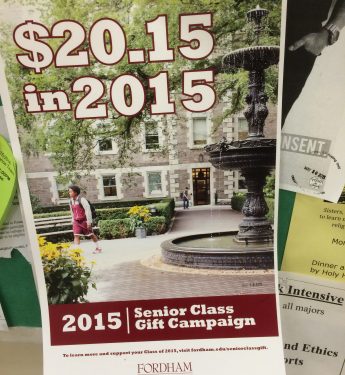We are taught the words the moment we arrive on campus. “We are Fordham.”
Yet, somehow, this becomes all too easy to forget. We think that Fordham is the administrators sitting in their offices. We think that Fordham is the campus. We think that Fordham is 441 East Fordham Road.
In the past few weeks, this internalized powerlessness (epitomized by the phrase “that’s Fordham”) showed significant signs of cracking.
A recent string of articles — featured in this publication and others — has shown that students are frustrated with many of the current policies facing the university.
The complaints cover a good amount of ground. The Office of Student Leadership and Community Development (OSLCD) seems to impede students more than it empowers them. The Office of Residential Life instills a climate of fear and distrust in its employees. Fordham administrators seem more interested in controlling students than listening to them. Even students in United Student Government (USG) and Campus Activities Board (CAB), arguably the two student organizations with the most power and access to sway university opinion and policy, complain that Fordham often acts more as a road block than as a spring board.
The unifying thread of these complaints is actually quite simple: Fordham is not taking student’s complaints seriously.
Certainly, there are some exceptions, perhaps most notably the formation this academic year of the Sexual Misconduct Task Force and the (mostly ignored) gains made by SAGES. But these are exceptions, not the rule.
Formal complaints to Human Resources from Residential Life employees appear to have resulted in no change. USG’s repeated attempts to loosen Fordham’s free speech policies have failed. Countless student initiatives have been suffocated in their cribs by an overbearing university administration.
The 2014-2015 school year may be ending, but the tide appears to be shifting in a lasting way. We need to make sure that students’ anger will not melt away over the summer.
For too long, Fordham has failed to take students’ concerns seriously. The solution is simple: we need to show them that we are serious. As the individuals who make Fordham the institution that it is, we need to make our anger, indignation and frustration clear.
My fellow seniors are beginning to experience the beginning of Fordham’s 2015 Senior Class Gift campaign. Fordham is asking each member of the class of 2015 to donate $20.15 as we bid the campus farewell.
Personally, I will not be donating to Fordham. Not yet.
I am incredibly proud of this university, the education I have received here and the amazing people I have met in my time here. But when Fordham asks me for money in the coming weeks, I will be telling them no — and I will be telling them why.
I am not donating a penny to Fordham until administrators show significant signs that they are willing to work seriously with students to draft and enact meaningful, lasting reform. I encourage all of my fellow senior Rams to do the same, and to make sure that Fordham knows why.
Administrators may not take massive student complaints seriously at first. But they will pay attention when their actions (or lack thereof) affects their bottom line.
We must ensure that administrators never forget the people who make Fordham possible: the students. Seniors and graduates can do this by withholding their donations. Underclassmen can do this by returning to Fordham in the fall ready to take the school to task.
What we need to prove is simple. We are Fordham. We are angry. And we demand that our university do better.
Canton Winer, FCRH ’15, and former Managing Editor of The Fordham Ram, is an American Studies and Sociology major from West Palm Beach, Florida.





